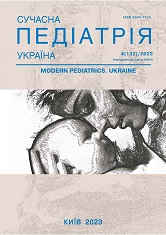The role of NF-kB in the mechanisms of inflammation of the stomach’s mucosa in children
DOI:
https://doi.org/10.15574/SP.2023.132.23Keywords:
children, chronic gastritis, nuclear factor kappa-BAbstract
Introduction. One of the important and unresolved issues of pediatric gastroenterology remains study of inflammation mechanisms of the stomach’s mucosa, as well as factors that regulate inflammatory reactions. Nowadays, there are many studies devoted to the research of the nuclear role of factor kappa B (NF-kB) in the regulation of the level of gene expression that control proliferation, cell apoptosis, angiogenesis, and determine the nature and expressiveness of the inflammatory process in adults. However, there are no conclusion regardless the role of NF-kB in the regulation of the mechanisms of inflammation development in the stomach’s mucosa of chronic gastritis (CG) in children.
Purpose - to study the level of NF-κB activity depending on the degree of gastric mucosa inflammation of chronic gastritis in children.
Materials and methods. We observed 76 children aged 8-16 years with verified chronic gastritis. To verify the diagnosis, all children underwent a morphological examination of the stomach’s mucosa in the fundal and antral departments of the stomach. An indirect streptavidin-peroxidase method of protection using polyclonal antibodies to NF-kB was used for immunohistochemical research.
Results. On the basis of the morphological study of gastric biopsies, we discovered inflammatory changes based of lymphocytic infiltration, microcirculatory disorders of the stomach’s mucosa with the subsequent development of stroma lamina propria fibrosis. During the immunohistochemical study of gastric biopsies, a high level of NF-kB expression was noted in the cytoplasm with a pronounced degree of inflammation, atrophy, and lymphocytic infiltration of the stomach’s mucosa.
Conclusions. The results of the study indicate the morphological signs of the formation of an early chronic inflammatory process in gastritis in children. The transcription factor NF-kB determines the level of inflammatory activity and plays a leading role in the mechanism of development of chronic gastritis in children.
The research was carried out in accordance with the principles of the Helsinki Declaration. The study protocol was approved by the Local Ethics Committee of the participating institution. The informed consent of the patient was obtained for conducting the studies.
No conflict of interests was declared by the author.
References
Abaturov AE, Gerasimenko ON. (2014). The role of TLR4, NLRC1/NOD1 and NF-κB in inflammation of gastric mucosa in children with Helicobacter infection. Child's Health. 3 (54): 74-79. https://doi.org/10.22141/2224-0551.3.54.2014.76004
Bąska P, Norbury LJ. (2022). The role of nuclear factor kappa b (NF-κB) in the immune response against parasites. Pathogens. 11: 310. https://doi.org/10.3390/pathogens11030310; PMid:35335634 PMCid:PMC8950322
Bobrova VI. (2015). Diseases of the gastroduodenal zone organs in children. Study guide for students of universities of the Ministry of Health of Ukraine. Kharkiv: Golden Pages: 160.
Bontems P, Aksoy E, Burette A et al. (2014). NF-κB Activation and Severity of Gastritis in Helicobacter pylori-Infected Children and Adults. Helicobacter. 19; 3: 157-167. https://doi.org/10.1111/hel.12118; PMid:24661597
Hayden MS, Ghosh S. (2012). NF-kB, the first quarter-century: remarkable progress and outstanding questions. Genes. Dev. 26: 203-234. https://doi.org/10.1101/gad.183434.111; PMid:22302935 PMCid:PMC3278889
Hsuan Hsieh, Hsiao-Bai Yang, Bor-Shyang Sheu, Yao-Jong Yang. (2022). Atrophic gastritis in Helicobacter pylori-infected children. Helicobacter. 27; 3. https://doi.org/10.1111/hel.12885; PMid:35306717
Meier-Soelch J, Mayr-Buro C, Juli J, Leib L, Linne U, Dreute J et al. (2021). Monitoring the levels of cellular NF-κB activation states. Cancers (Basel). 13 (21): 5351. https://doi.org/10.3390/cancers13215351; PMid:34771516 PMCid:PMC8582385
Moorchung N, Srivastava AN, Sharma AK, Achyut BR, Balraj Mittal B. (2010). Nuclear factor kappa-B and histopathology of chronic gastritis. Indian J Pathol Microbiol. 53 (3): 418-421. https://doi.org/10.4103/0377-4929.68255; PMid:20699495
Mussbacher M, Derler M, Basílio J, Schmid JA. (2023). NF-κB in monocytes and macrophages - an inflammatory master regulator in multitalented immune cells. Immunol: 23. https://doi.org/10.3389/fimmu.2023.1134661; PMid:36911661 PMCid:PMC9995663
Mussbacher M, Salzmann M, Brostjan C, Hoesel B, Schoergenhofer C, Datler H et al. (2019). Cell type-specific roles of NF-κB linking inflammation and thrombosis. Front Immunol 10: 85. https://doi.org/10.3389/fimmu.2019.00085; PMid:30778349 PMCid:PMC6369217
Napetschnig J, Wu H. (2013). Molecular basis of NF-κB signaling. Annu Rev Biophys. 42: 443-468. https://doi.org/10.1146/annurev-biophys-083012-130338; PMid:23495970 PMCid:PMC3678348
Pfannkuch L, Hurwitz R, Trauisen J et al. (2019). ADP heptose, a novel pathogen-associated molecular pattern identified in Helicobacter pylori. FASEB J. 33 (8): 9087-9099. https://doi.org/10.1096/fj.201802555R; PMid:31075211 PMCid:PMC6662969
Rahman MM, McFadden G. (2011). Modulation of NF-κB signalling by microbial pathogens. Nat Rev Microbiol. 9: 291-306. https://doi.org/10.1038/nrmicro2539; PMid:21383764 PMCid:PMC3611960
Xiang S, Zhao Z, Zhang T et al. (2020). Triptonide effectively suppresses gastric tumor growth and metastasis through inhibition of the oncogenic Notch1 and NF-κB signaling pathways. Toxicology and Applied Pharmacology. 388. https://doi.org/10.1016/j.taap.2019.114870; PMid:31866380
Downloads
Published
Issue
Section
License
Copyright (c) 2023 Modern pediatrics. Ukraine

This work is licensed under a Creative Commons Attribution-NonCommercial 4.0 International License.
The policy of the Journal “MODERN PEDIATRICS. UKRAINE” is compatible with the vast majority of funders' of open access and self-archiving policies. The journal provides immediate open access route being convinced that everyone – not only scientists - can benefit from research results, and publishes articles exclusively under open access distribution, with a Creative Commons Attribution-Noncommercial 4.0 international license (СС BY-NC).
Authors transfer the copyright to the Journal “MODERN PEDIATRICS. UKRAINE” when the manuscript is accepted for publication. Authors declare that this manuscript has not been published nor is under simultaneous consideration for publication elsewhere. After publication, the articles become freely available on-line to the public.
Readers have the right to use, distribute, and reproduce articles in any medium, provided the articles and the journal are properly cited.
The use of published materials for commercial purposes is strongly prohibited.

